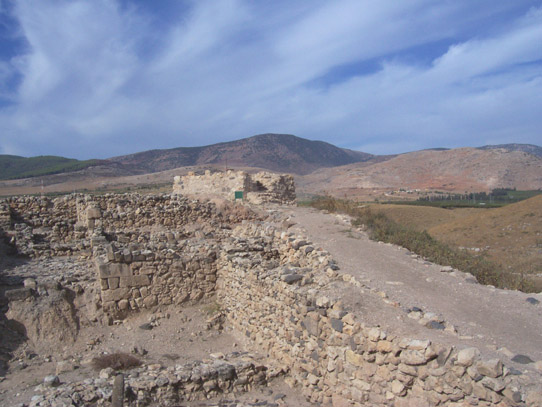|
|
- Archaeological
Find in Israel
|

- Do
we provoke the Lord to jealousy?
|
- Behold Israel after the flesh: are not they which
eat of the sacrifices partakers of the altar? What say I then?
that the idol is any thing, or that which is offered in sacrifice
to idols is any thing? But I say, that the things which the Gentiles
sacrifice, they sacrifice to devils, and not to God: and I would
not that ye should have fellowship with devils.
-
- Ye cannot drink the
cup of the Lord, and the cup of devils: ye cannot be partakers
of the Lord's table, and of the table of devils. Do we provoke
the Lord to jealousy? are we stronger than he? All things are
lawful for me, but all things are not expedient: all things are
lawful for me, but all things edify not. Let no man seek his
own, but every man another's wealth. Whatsoever is sold
in the shambles, that eat, asking no question for conscience
sake: For the earth is the Lord's, and the fulness thereof. If
any of them that believe not bid you to a feast, and ye be disposed
to go; whatsoever is set before you, eat, asking no question
for conscience sake. But if any man say unto you,
-
- This is offered in sacrifice
unto idols, eat not for his sake that shewed it, and for conscience
sake: for the earth is the Lord's, and the fulness thereof: Conscience,
I say, not thine own, but of the other: for why is my liberty
judged of another man's conscience? For if I by grace be a partaker,
why am I evil spoken of for that for which I give thanks? Whether
therefore ye eat, or drink, or whatsoever ye do, do all to the
glory of God. (1
Corinthians 10:18-31 kjv)
- .
|
|
|
|
|
-
The
First Epistle of Paul to the CORINTHIANS
Corinth was an important
cosmopolitan city located in the Roman province of Achaia (the
southern part of modern-day Greece) on a large isthmus about
fifty miles west of Athens, It was situated along a major trade
route and had a thriving economy. For this reason, large numbers
of sailors and merchants from every nation flocked to the city
of Corinth.
-
- During the first century, it was one of the largest
cities in the Roman Empire and by the end of the second century
it had become one of the richest cities in the world.
Corinth was a strategic center of influence for the gospel
since those travelers who heard the gospel there could carry
it to all parts of the world. The city of Corinth, however, was
one of the wickedest cities of ancient times. Immorality, unscrupulous
business dealings, and pagan practices abounded.
-
- Of the scores of heathen religions that were practiced
in the city, the most well-known was the worship of Aphrodite,
the goddess of love and beauty. The temple of Aphrodite stood
on the most prominent point in the city, a hill called Acrocorinth,
and housed one thousand "temple prostitutes."
Paul was able to establish a church in Corinth during
his eighteen month residence there (about A.D. 52-53) on his
second missionary journey (Acts 18:1-11; 1 Cor. 2:1, 2). Pal
lived and worked as a tentmaker with two other Jewish converts,
Aquila and Priscilla, who had recently come from Rome (Acts 18:1,
2). When Paul left Corinth, a man named Apollos ministered there
after Aquila and Priscilla had more completely expounded the
gospel to him (Acts 18:26, 27; 19:1; see 1 Cor. 1:12; 16:12).
-
- Three years after this, Paul wrote this letter
from Ephesus to the Corinthian believers. Later, Paul received
a report from the members of the household of Chloe concerning
the bad conduct of some in the church (1 Cor. 1:11). Many of
the members had recently been converted from paganism and were
having difficulty breaking habits of their former lifestyles.
There were such deep divisions among them that some of the believers
were bringing lawsuits against one another and allowing unbelieving
judges to settle the disputes (chap. 6).
Paul reprimanded the church for failing to discipline
certain of its members who were guilty of gross immorality (chap.
5). He also gave them counsel regarding some of the common marriage
problems, and instructed them in the proper conduct of those
who were unmarried (chap. 7). In addition, Paul discussed the
eating of meats offered to idols (1 Cor. 8; 10:18- 31), abuses
of the Lord's Supper (1 Cor. 11:17-34), spiritual gifts (chaps.
12; 13), conduct is the formal assemblies for worship (1 Cor.
11:2-16; 14:1-40), and the resurrection (chap. 15). [Source
for Introduction of chapter: Hebrew Greek Key Study Bible KJV
edited by Spiros Zodhiates, Th.D. AMG Publishers, Chattanooga,
TN 37422]
|
|
|
|
|
-
-
-
|